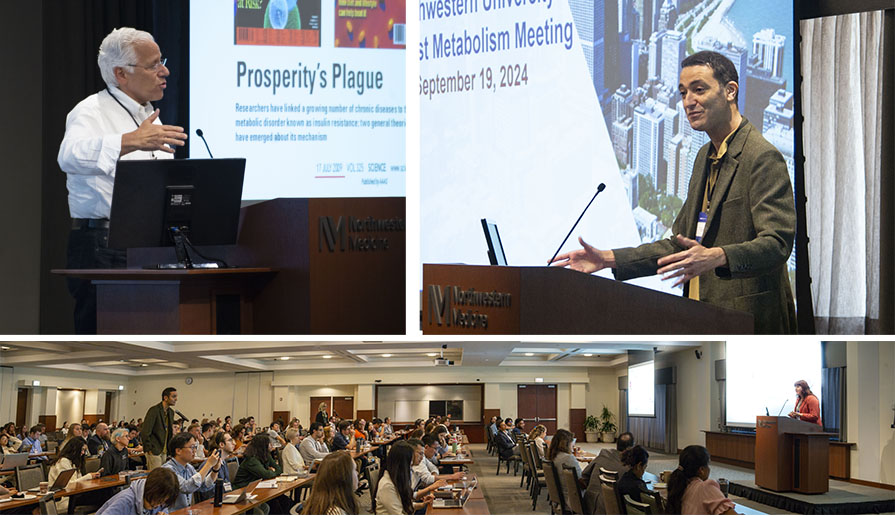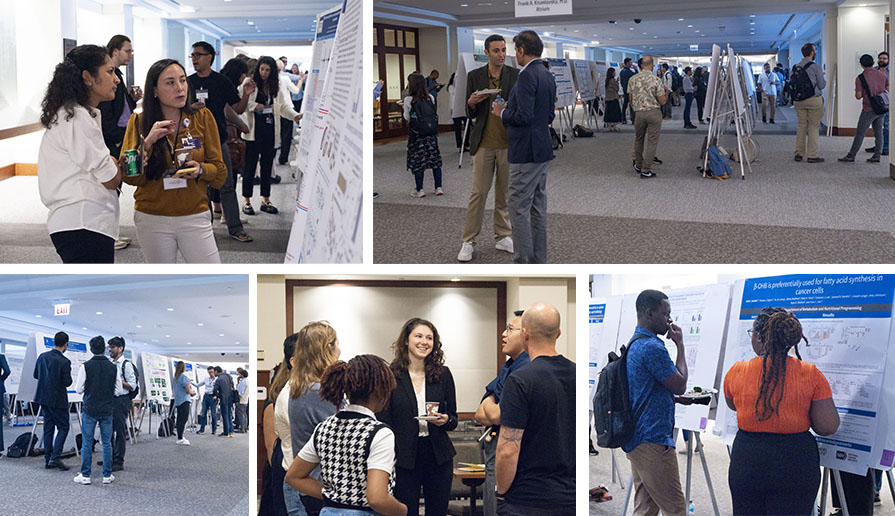Midwest Metabolism Meeting Fosters Future Breakthroughs

The Robert H. Lurie Comprehensive Cancer Center of Northwestern University hosted the Midwest Metabolism Meeting (M3) on September 19, 2024. Designed to facilitate the exchange of cutting-edge knowledge and discoveries, the symposium brought together students, postdoctoral fellows, and leading scientists from labs across the Midwest to explore the role of metabolism in cancer and other diseases.
Richard DiMarchi, PhD, Distinguished Professor of Chemistry and Gill Chair in Biomolecular Sciences at Indiana University, delivered the keynote lecture, "The Transformative Discovery of Drugs with Integrated Multiple Hormone Activities to Address Obesity." His insights from decades of pioneering metabolic research underscored the importance of peptide-based therapies for treating obesity and diabetes.

Postdocs and graduate students were invited to take center stage, giving them a unique opportunity to present their work and respond to challenging questions from experienced scientists. Lurie Cancer Center members, Navdeep Chandel, PhD, Professor of Medicine and Biochemistry and Molecular Genetics; Issam Ben-Sahra, PhD, Associate Professor of Biochemistry and Molecular Genetics; and Clara Peek, PhD, Assistant Professor of Biochemistry and Molecular Genetics and Medicine at Northwestern University Feinberg School of Medicine, co-chaired the Midwest Metabolism in Chicago.
Chandel stressed the importance of providing this type of platform for young researchers. “It’s a great chance to present outside of your own institution," he said. "Like anything else, it takes practice to get good at giving talks. It’s also a chance for them to potentially land future jobs as faculty, staff, postdocs, or grad students, depending on where they are in their careers."
Ram Chakrabarty, a graduate student in Chandel’s lab, highlighted the importance of the synergistic environment that M3 fosters. “These kinds of events are so important because they help build collaboration. You meet so many different researchers, and you never know when you might be able to help each other down the line."
Kim Huggler, a graduate student from the Cantor Lab at the University of Wisconsin, remarked how the symposium contributes to the development of a broad array of vital skills for scientists. “The ability to share your work and receive feedback that can foster new ideas is so valuable,” she said. “Not to mention being able to practice presenting, designing slides, and telling your story is very useful for just about anyone in science.”
Ben-Sahra noted the exceptional quality of the trainees' research and the way their work contributes to the larger scientific conversation within metabolism research. "The trainees exhibited a commendable commitment to basic research, emphasizing the need to thoroughly dissect these mechanisms before pursuing therapeutic applications," he said. "Their work, which ranges from elucidating the regulation of metabolic pathways to identifying novel biomarkers and therapeutic targets, is laying the groundwork for future breakthroughs."
Reflecting on the success of the symposium, Chandel expressed optimism about the direction the field is heading. "With all the new technologies and excitement from younger researchers, it's obvious the field has a bright future ahead.”
Photos from the event available on Flickr
By Constantine Platanias
